A Capital Idea
Fielding Miller's hunch led to a leading investment firm and a School of Entrepreneurship at ECU
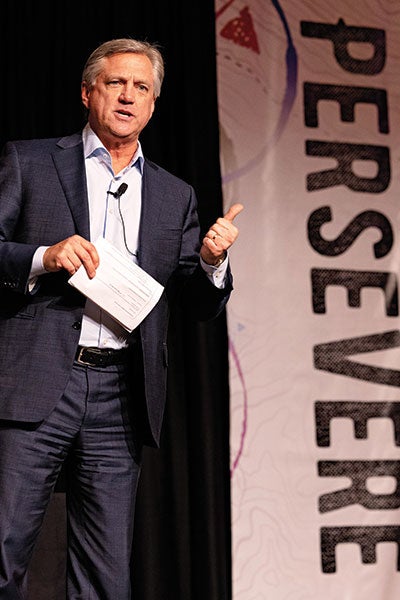
Fielding Miller speaks at the 2022 U.S. Association for Small Business and Entrepreneurship Conference in Raleigh. The organization recognized him with the John E. Hughes Award for Entrepreneurial Achievement.
Fielding Miller ’84 is the founding partner, chairman and CEO of CAPTRUST. The company launched as an entrepreneurial start-up in 1997 and has grown to be the nation’s largest independent financial advisory firm with thousands of clients, representing more than $1 trillion in assets.
Miller, who is serving in his third term on the ECU Board of Trustees, and his wife, Kim ’83, have been involved in giving back to ECU in numerous ways. In 2015, they made a leadership gift to the university establishing the Miller School of Entrepreneurship in the College of Business. For nearly a decade, the Miller School has served as a regional hub that prepares students to take an entrepreneurial mindset and skill set into their communities.
Recently, East visited Miller in his Raleigh office to discuss his journey building CAPTRUST and lessons he has learned along the way.
What is CAPTRUST?
We are a financial advisory and investment firm headquartered in Raleigh, representing private clients, corporations and nonprofit organizations.
Our founding vision was based on an opportunity we saw to compete in a way that would differentiate us from other advisory firms. The idea was to serve clients in a fiduciary capacity, which means we are legally bound to always put our clients’ interests ahead of our own. Sounds logical, but the financial industry was, and still is, dominated by large brokerage firms that are not fiduciaries. Thus, when investors are searching for an advisor, and learn about the higher standard we are bound to, they understand and value the difference.
CAPTRUST recently announced a partnership with Carlyle, which invested a substantial amount for a minority stake in the company. How does this relationship benefit CAPTRUST?
When we launched the firm, we funded it with our personal capital and a small amount of debt. As our model began to gain traction, we decided to expand our operation beyond North Carolina by acquiring smaller firms, primarily in the Southeast.
Initially, we funded our acquisitions primarily with our cash flow, but as the volume of transactions increased, we needed more capital. At this point we had three choices: Slow down our pace of transactions, borrow more money or bring in an equity partner to inject more equity capital.
Since we did not want to slow down our transaction tempo, and we did not want to over leverage the business, we decided our best path was to bring in an equity partner. We interviewed several private equity firms to find a partner that would meet our specific requirements: minority ownership with no path to majority, a seven-year minimum investment period and a valuation that reflected our leadership position in the market. Through this process, we partnered with GTCR, a Chicago-based firm with deep expertise in financial services, in 2020.
With the new capital, our growth continued to accelerate and we completed 40 transactions within the next three years. By 2023, we needed more capital. So, we went back to the market, and that fall we partnered with Carlyle with almost identical terms as the GTCR transaction.
As one of the most successful private investors in the world, Carlyle has a vast array of resources and subject matter experts with whom we can engage. We have already benefited from their expertise in artificial intelligence and machine learning, digital marketing capabilities, risk management and more.
What do you believe are the keys to CAPTRUST’s growth?
Two drivers. The first being the fiduciary model and the second being the tremendous team we have assembled. We are loaded with hard-working, talented professionals who are aligned in a positive, ethical and collaborative culture where every employee has a path to equity ownership that is awarded, not purchased.
In terms of what we have been able to accomplish, I will offer up a few bragging points. Since inception 26 years ago, our employee count has grown from 13 to over 1,600, and our locations have increased from one to 82. We have clients in every state, our client retention rate is 98% and our employee turnover rate is among the lowest in our industry. Our employee-led and run community foundation, the CAPTRUST Community Foundation, invests seven figures each year in children’s charities across the country. All of this accomplished while growing at a compounded rate of 23% per year. As I said, we have a tremendously talented team, and they bring it every day.
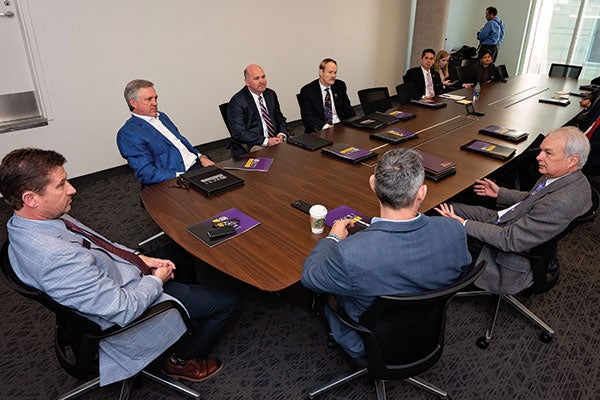
Fielding Miller, second from left, meets with faculty, alumni and students of the College of Business. Also pictured are Dean Michael Harris, left, and former Dean Stan Eakins, in the gray jacket.
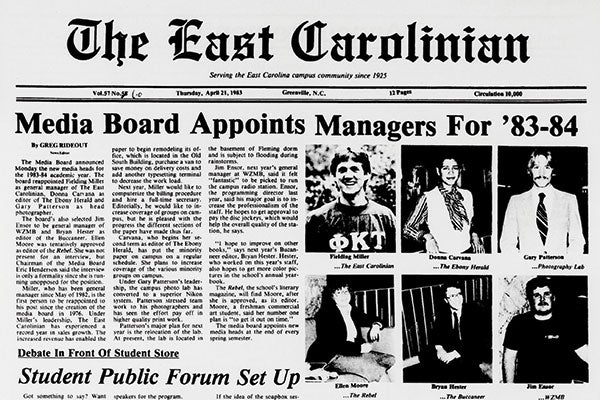
the lead story in the April 21, 1983, issue of The East Carolinian includes Miller’s reappointment as general manager of the paper. He’s pictured on the top left.
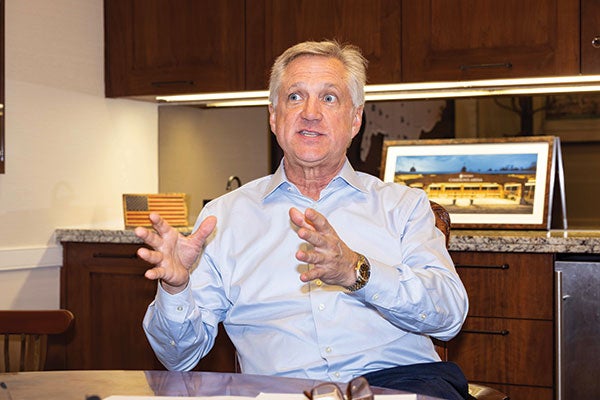
Miller talks in his Raleigh office.
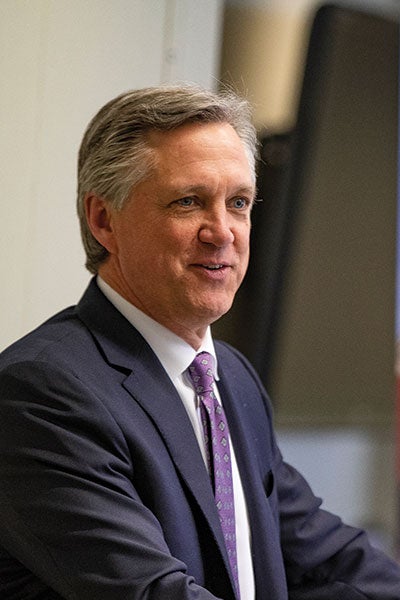
CEO Tips for Success
- Focus on culture
One of my favorite business quotes from Peter Drucker is, “Culture eats strategy for breakfast.” You cannot overemphasize the importance of building a team that is fully committed to building and perpetuating a positive and collaborative culture. - Plan for the best but prepare for the worst
Any business is going to face adversity, and that is when the power of a strong and collaborative culture pays off. You need to create an environment where people are not fearful of adversity but instead are energized by the opportunities that come from it. - Share the rewards of your success
Everybody at CAPTRUST has a path to ownership. The concept is simple: The more colleagues we have walking the halls, thinking and acting like owners, the more successful we will be.
How has CAPTRUST’s growth broadened the company’s capabilities to meet client needs?
As we have increased our size and scale, we have more capital to invest back in the business. More recently we have added new services and capabilities ranging from new investment portfolios, technologies, tax advisory and more. With each new offering, we have increased our value to our clients and created more compelling reasons for new clients to join us.
What inspired your commitment to leading the effort to start an entrepreneurship school at ECU?
I had a wonderful experience at East Carolina. It was the right school for me at the right time and, best of all, I met my lovely wife, Kim. Over the years we made various financial contributions, but we wanted to do something more impactful.
I had several conversations with (former dean) Stan Eakins, mostly when he would corner me at a football game tailgate to discuss fundraising for the business school. I explained that we were interested in investing in a program that we (ECU) can be genuinely great at, a program that would differentiate ECU from other schools in the state.
That is how we landed on entrepreneurship. We could create the first named school of entrepreneurship in the state, and we could help fulfill the university’s mission to support regional transformation by educating job creators. And nothing is more vital to the future success of eastern North Carolina than creating good jobs.
Has the school fulfilled your expectations?
I do not even know what my expectations were. It was more of a vision than a specific plan. Thanks to the leadership of Dr. Eakins and later Mike Harris, the program flourished from the very beginning. We were thrilled to learn we were ranked in the top 50 programs in the U.S. (Princeton Review’s list of entrepreneurship programs), and this was before we had been approved for a formal degree: Bachelor of Science in entrepreneurship. Since then, we have made that list each year and have been moving up in the rankings; we are currently ranked 37th.
What are the highlights so far?
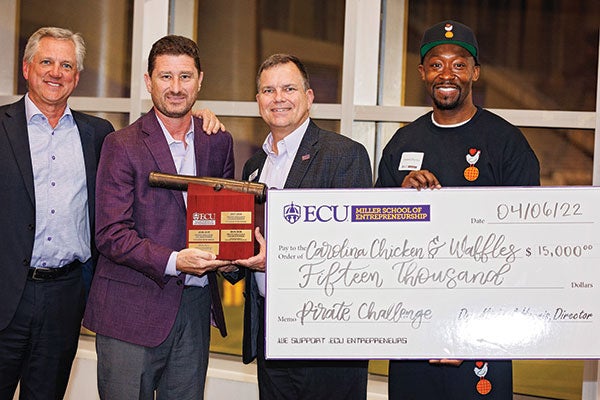
From left, Fielding Miller; Michael Harris, dean of the College of Business; Paul Schwager, former COB dean; and student Jamerus Payton pose with a ceremonial winners check at the 2022 Pirate Entrepreneurship Challenge.
It was clear that we were on to something when we held the first Pirate Entrepreneurship Challenge. I was stunned to learn that after seven years this competition has featured over 550 teams from more than 50 different majors across the campus and provided over $900,000 in cash and in-kind prizes for the winning teams. I recall the big smile on Mike Harris’ face when he said, “This entrepreneurship idea might have some legs after all.”
If CAPTRUST were a case study for students in the ECU College of Business or the Miller School, what would be the most important thing students would learn?
Entrepreneurship is a mindset. Instead of seeing problems, you see opportunities to fix problems. In many cases, entrepreneurs identify an opportunity stemming from a problem that is not being addressed within the company you are working for. You notice the company is losing customers or not gaining new customers due for some specific reason – a reason they are not willing to change.
Be patient. Most successful entrepreneurs launch their businesses at age 37. Success often comes from experience learned from your own failures or your observance of how others have failed.
What are your hopes for the impact of the Miller School for years to come?
We had hoped that once the school was established, it would resonate with other entrepreneurs to engage and invest. Thanks to other graduates, such as Van Isley, who founded the Isley Innovation Hub, and Matt Crisp, who funded the Crisp Small Business Resource Center, and many others that have stepped up to enhance and grow the program. In terms of impact, my hope is the Miller School will be a key catalyst to economically revitalize the eastern region of North Carolina.
